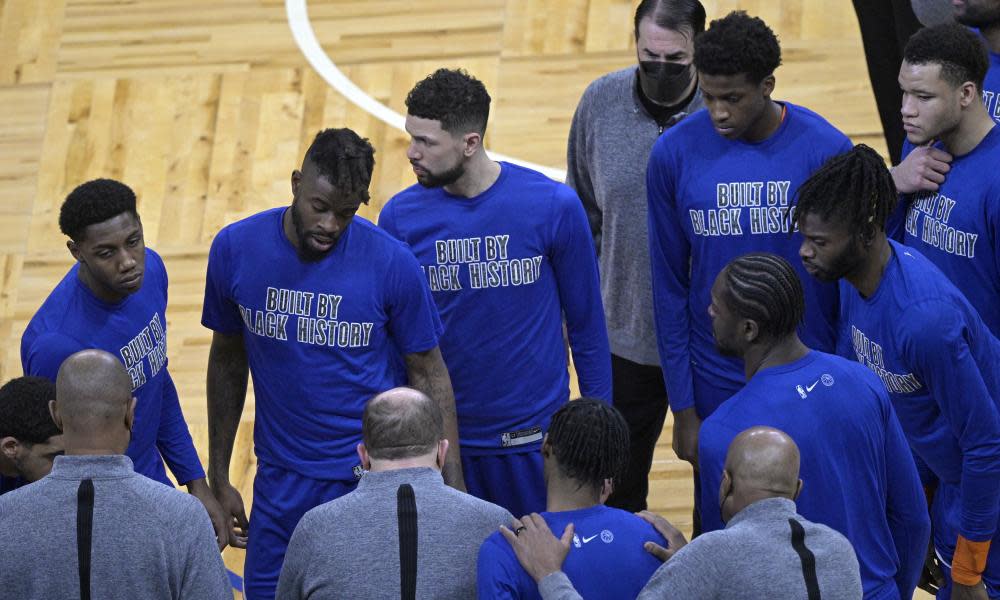Black History Month means grappling with the full legacy of racism in the US

In 1926, Carter G Woodson started “Negro History Week” to rectify the fact that Black people “were overlooked, ignored, and even suppressed by the writers of history textbooks and the teachers who use them”.
Woodson chose the second week of February because it coincided with the birthdates of President Abraham Lincoln and the slavery abolitionist Frederick Douglass. In 1970, Black educators and students at Kent State University began using the entire month of February to celebrate and recognize Black triumphs and tribulations. US presidents started to formally designate February as Black History Month in 1976. In recent years, other countries including Canada, the United Kingdom, the Netherlands, and Ireland have formally recognized and celebrated the history of the African diaspora.
But the reality this Black History Month is that there are still numerous obstacles to real racial equity.
Republicans in several states recently threatened to remove funding from schools and colleges that teach the 1619 Project, the New York Times’ special project on the history of US slavery. Those Republicans would rather roll back the clock on racial progress than teach our children the truth about the founding – and continued state – of America.
We celebrate Vice-President Kamala Harris, while acknowledging the sacrifices of Shirley Chisholm. We celebrate Amanda Gorman, while acknowledging the legacy of Maya Angelou
We’re seeing an even more troubling trend concerning voting rights. Rather than embracing the fact that more Americans voted in the 2020 presidential election than in any other election in American history, some politicians, like state legislators in Georgia, want to inhibit access to the polls. This is a slap in the face to people such as the late Congressman John Lewis, who was beaten – bloodied but unbowed – by police as he marched for civil rights on the Edmund Pettus Bridge in 1965. It’s also a slap in the face to the many Black people who had cigarettes burned into their skin and coffee poured on their heads as they simply tried to sit in diners and have a pastry. It is equally disrespectful to the Little Rock Nine, who helped integrate schools, and lawyers and activists like Thurgood Marshall and Charles Hamilton Houston, who worked tirelessly in the courts for the cause of desegregation.
It is easy to say that the conservative politicians fighting racial progress are misguided. But most of them understand perfectly well what they’re doing. This is who America was, and still is to this day. We must acknowledge the bitter irony of people storming the US Capitol to reclaim a building that was built on the backs of enslaved Black Americans.
Learning our history, then, is about truth. But it is also about reconciliation: making amends for the pain caused to generations of Black Americans. This is why it is so important that the state of California recently passed a truth and reconciliation bill. Like Princeton University and Georgetown University, the state of Virginia is requiring state universities to pay reparations for how slavery bolstered their endowments. Cities like Asheville, North Carolina, and Evanston, Illinois, have implemented various reparations plans. The state of Maryland has the Harriet Tubman Community Investment Act, which is being considered before the House of Delegates. US Congresswoman Barbara Lee has proposed a truth and reconciliation bill, while Congresswoman Sheila Jackson-Lee continues to advance reparation bill HR40. Cory Booker has introduced companion bills in the US Senate. These bills are a collective attempt to contend with the direct link between American slavery and the racial wealth gap today. (Federal land may provide part of the answer.)
Related: A corporate, commodified Black History Month is taking hold. We can't let it | Malaika Jabali
We must bear witness to America’s rawness in all its glory and failures. Only then can we truly even start to engage in the process of reconciliation and monetary restitution for centuries of enslavement and systemic racism.
Black History Month is about recognition and celebration, but also about truth and reconciliation. We celebrate Vice-President Kamala Harris, while acknowledging the sacrifices of Shirley Chisholm. We celebrate Amanda Gorman, while acknowledging the legacy of Maya Angelou, who paved the way. We celebrate the success of Oprah Winfrey, while acknowledging that systemic racism and sexism have prevented thousands of other Oprahs from becoming successful. We celebrate the lives that Breonna Taylor saved as an EMT, while acknowledging how that very system of public safety badly failed her and perpetuates police profiling and brutality. We celebrate a shot or run by Black athletes on the field, while acknowledging all the investments they make to empower their communities off the court.
At heart, Black History Month is about celebrating the many Black firsts that are still occurring despite systemic barriers, while acknowledging that Black ancestors built much of the physical, economic and cultural foundation that the United States stands upon.
Rashawn Ray is a David M Rubenstein fellow at the Brookings Institution and professor of sociology at the University of Maryland

 Yahoo News
Yahoo News 
